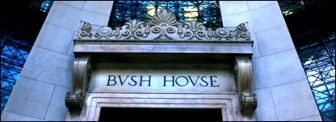(BBC) BBC World Service today announced cuts which will amount to over 600 jobs, including its Caribbean Service.
Other services being closed are the Albanian, Macedonian, Serbian, and Portuguese for Africa broadcasts.
A BBC press release said the closures were part of its response to a cut to its Grant-In-Aid funding from the UK’s Foreign & Commonwealth Office (FCO).
 The cut is part of a BBC World Service restructure in order to meet a 16% savings target announced in the Government’s Spending Review of 20 October last year.
The cut is part of a BBC World Service restructure in order to meet a 16% savings target announced in the Government’s Spending Review of 20 October last year.
BBC Global News Director Peter Horrocks said: “These closures are not a reflection on the performance of individual services or programmes. They are all extremely important to their audiences and to the BBC.
“It is simply that there is a need to make savings due to the scale of the cuts to the World Service’s Grant-in-Aid funding from the UK’s Foreign & Commonwealth Office and we need to focus our efforts in the languages where there is the greatest need and where we have the strongest impact.”
Controller, Languages at BBC World Service, Liliane Landor described BBC Caribbean as: “The Caribbean Service, one of the oldest and most distinguished services that the BBC has provided in English.”
Closure
The Caribbean Service transmissions are used on 48 partner stations across the English, Spanish, and Dutch Caribbean and as part of the Caribbean stream on four FM relays in Jamaica, Trinidad, Barbados, and Antigua-Barbuda.
Its flagship programmes are BBC Caribbean Report – morning and evening drivetime editions.
The cultural programme BBC Caribbean Magazine has reflected the human side of the news as well as reporting on the region’s music and literature.
And BBC Sports Caribbean is provided by World Service for the Caribbean programme stream.
The website www.bbccaribbean.com received its biggest page impressions from the Caribbean diaspora in the US, Canada, and the UK.
History
The early roots of the Caribbean Service began in 1939. The programme Calling the West Indies featured West Indian troops on active service during World War Two to read letters on air to their families back home.
From 1943 to 1958, the programme became Caribbean Voices which highlighted West Indian writers.
During this period, new writers, including VS Naipaul, George Lamming, Andrew Salkey and Samuel Selvon worked and produced their first works.
In 1949, the segment We see Britain was introduced as part of the programming for the Caribbean under the management of cricketer-turned-producer Ken Ablack.
The Service went on for the next three decades nurturing the talents of producers and presenters such as Louise Bennett, Jones P Madeira, and Trevor MacDonald.
The Service was closed in the mid 1970s with Caribbean Magazine remaining on air, produced by a separate BBC department.
It was re-opened in 1988 as a news and current affairs department, later taking over Caribbean Magazine as part of the Caribbean stream of programming for the Caribbean.
Its opening presentation team were Hugh Crosskill, Jerry Timmins, and Pat Whitehorne.
Debbie Ransome, Head of BBC Caribbean Service said: “After one of our best years ever editorially, this has been a great blow for the team here.”
“Given what we know BBC Caribbean means for providing pan-Caribbean coverage for a strong radio audience, plus the online links it provides between the Caribbean and its diaspora, and the amount of goodwill it brought for the BBC from a loyal audience, clearly a void will be left.”









